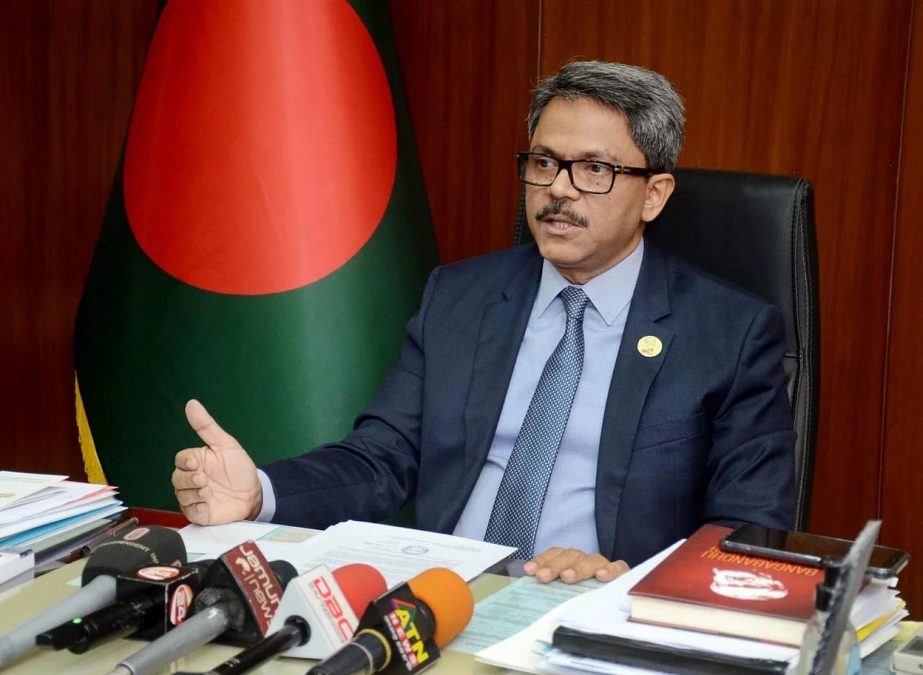
UNB, Dhaka :
State Minister for Foreign Affairs Md Shahriar Alam on Sunday said the government will ask explanation from the US side on the recently published human rights report noting that there are fundamental flaws in the report.
While briefing reporters at the Ministry of Foreign Affairs, he said the government will also remain engaged with the US government as there are issues of discussion in a number of areas.
Foreign Secretary Masud Bin Momen was also present at the briefing.
Bangladesh, a country of 170 million, follows rule of law, human rights and good governance and therefore, its economic achievements are significant, said the state minister.
The report appears to encourage creating a “society of lawlessness to destabilize” the society and the government, said the Ministry of Foreign Affairs in a separate press statement
Despite all challenges, the government, for the sake of its own commitment made to the people, will continue its endeavours to improve the wellbeing and ensure the rights and dignity of its people, MoFA said.
The report titled ”Bangladesh 2021 Human Rights Report”, was released on 13 April 2022 by the Bureau of Human Rights, Democracy and Labour of the US Department of State.
The government took note of all the observations therein collected mainly from the NGO/INGO sources of reporting.
Information/data has also been collected from newspapers that surely suggest that the media is able to exercise their way of reporting things, said the Ministry of Foreign Affairs in the statement after the briefing.
While a number of unsubstantiated figures vis-a-vis human rights situation posed the purpose of the source questionable, there are also a few factual errors in the report.
For example, MoFA said though “We do not endorse their information, the Ain of Salish Kendra (ASK) mentioned 275 extrajudicial killings in January-May 2018 period, while the US report wrongly cited ASK in mentioning that there were 606 extrajudicial killings in May-June 2018.”
When making critical observations and comments about the human rights situation in Bangladesh, the sources often chose to remain forgetful, juxtaposed to their ‘statistics’ of human rights issues, that Bangladesh is a country of more than 170 million people, and that it is making enormous people-centric development with an ultimate aim of progressively ensuring all human rights of its people in quality terms, the statement reads.
The US report was critical about the status of prohibition of forced labour, but didn’t highlight how Bangladesh is progressively realizing the labour rights, Shahriar Alam said.
The report came from a side that ratified only 2 out of 8 fundamental conventions of ILO, whereas Bangladesh ratified all the 8 conventions, he said.
The Government of Bangladesh is of the view that the tendency to impose values of a select few of other countries, like LGBT rights, same sex marriage etc., in the name of human rights violations are “regrettable and uncalled for”, MoFA said.

The report tried to capture broad range of issues, even including 2018 election, which compromised with substance and objectivity, it said.
A few instances of the partial pictures the report captured in highlighting protection gap in the legal system include, arbitrary arrest, for example.
“No act of arrest by the law enforcement agencies goes unaccountable bypassing the magistrate of the court. In each case, the magistrate decides whether an arrest is lawful or not,” MoFA said.
Therefore, MoFA said, the law enforcers don’t enjoy the immunity of commissioning ‘Arbitrary Arrest’.
Again, the government said, throughout the report the existing system of accountability of the law enforcement agencies is heavily underplayed.
“The legal system does not allow killing by arbitrary use of firearms. The magistrate requires members of the law enforcement agencies to account for every single use of firearms, without lawful explanation of which faces legal action.”
The death sentences to the 16 RAB officials in the Narayanganj seven-murder case, or the recent death sentences to two police officials in the Major Sinha murder case in Cox’s Bazar, are examples of accountability and non-impunity to law enforcers, MoFA said.
While referring to cases of enforced disappearance, the report did not mention whether the families of the disappeared persons filed cases with the court to report ‘enforced’ disappearance at the time of the occurrence, according to MoFA.
“In the absence of such case, or the victim family’s voluntariness of filing a case reporting disappearance, it is rather unlawful to conclude that law enforcement agencies abducted.”
In fact, Bangladesh can also quote from many authentic sources on similar abuses and violations existing everywhere, MoFA said.
The report also surprisingly mentioned a few Rohingya cases without adequate acknowledgement that the government continues to remain supportive of an environment respectful of the basic rights and well-being of Rohingyas, despite not being a Party to the 1951 Convention, it said.
Also the report mentions about deaths of Rohingyas in the high sea, the tragic incidents which do not have any relevance with Bangladesh’s efforts to ensure wellbeing, according to MoFA.
The Government of Bangladesh does not deny the fact there are indeed a lot of areas of development to ensure better protection and promotion of human rights, and the government is continuing to make steady strides towards that end, reads the MoFA press statement.
The government underscores that there are indeed capacity issues to adequately observe the standards of human rights, it said, adding that “A gesture of cooperation with support for strengthening the capacity across the relevant systems would be helpful to address the gaps.”
The government remains intensely engaged with the UN human rights mechanism, and receptive of constructive recommendations from all international development partners, including the USA, said MoFA.

